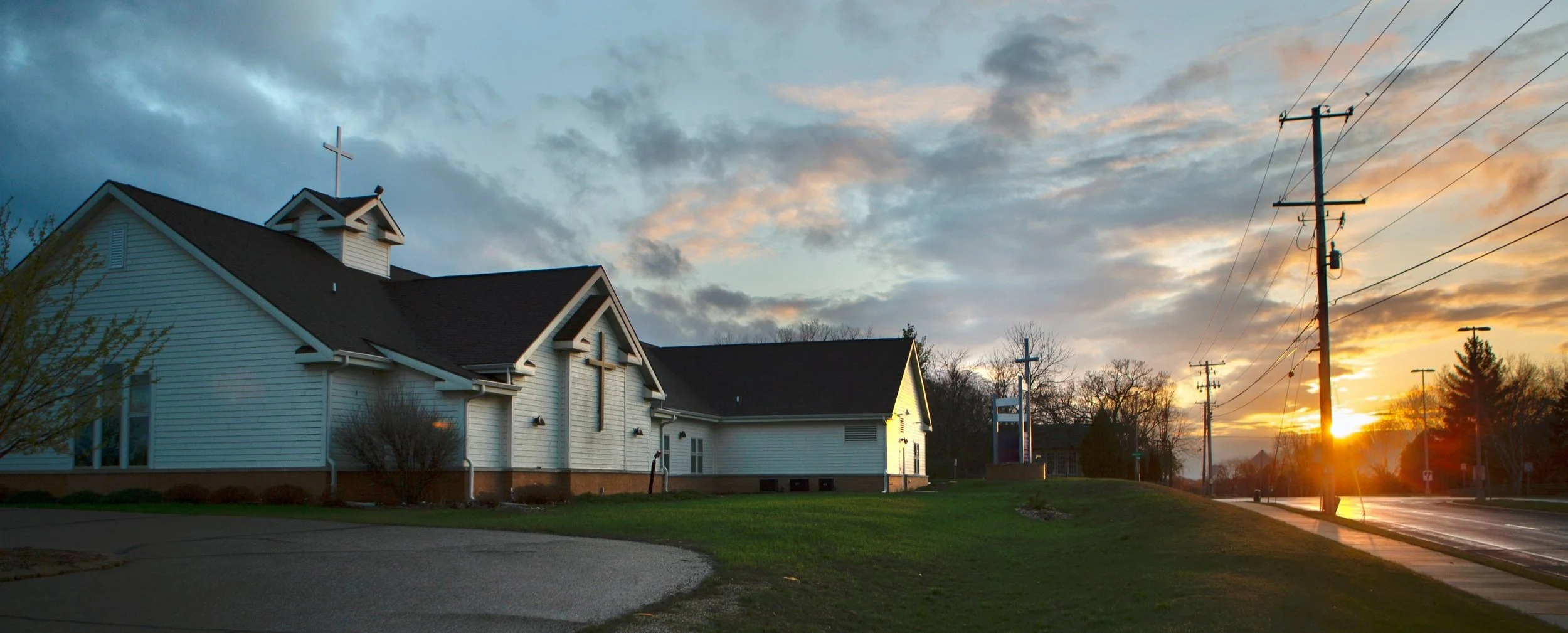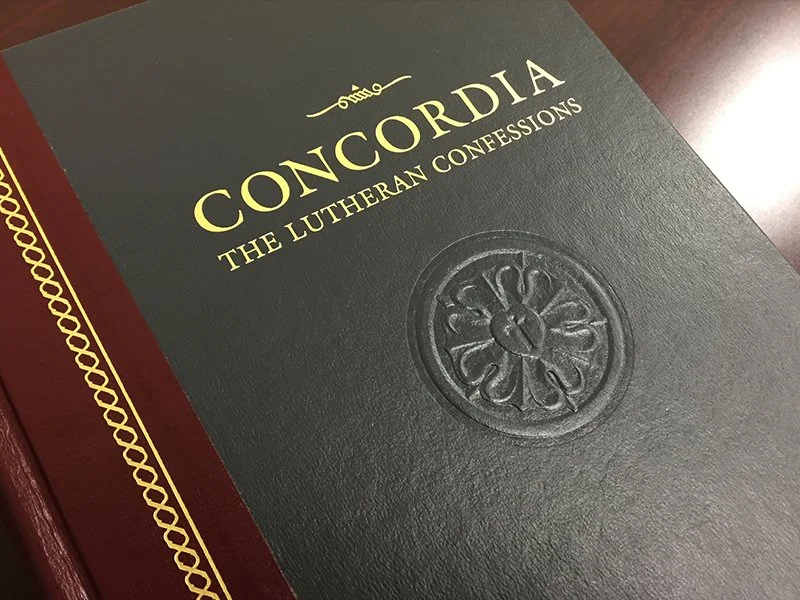Lutheran Stuff
This is where Steve and Paulette Kozar go to church: Risen Savior Lutheran Church in McFarland, Wisconsin
If you’re interested in understanding more about “Confessional Lutheranism” this is the page to help get you started. Just remember that an actual pastor of an actual confessional Lutheran church is where you ultimately need to go to learn properly.
“Also they teach that men cannot be justified before God by their own strength, merits, or works, but are freely justified for Christ’s sake, through faith, when they believe that they are received into favor, and that their sins are forgiven for Christ’s sake, who, by His death, has made satisfaction for our sins. This faith God imputes for righteousness in His sight.”
First of all, what does “confessional” mean? It’s a way of differentiating a true Lutheran church from the more modern Lutheran churches that no longer hold to (or “confess”) the original beliefs that define Lutheran theology. The Book of Concord is where various Lutheran statements of belief and teaching were bound together into one book to clarify sound, biblical Christian beliefs.
This is the beautiful and very detailed “Book of Concord” published by Concordia Publishing House
In the first 100 years or so of Protestant history, it was important for Lutherans (and other Protestants) to write down exactly what they believed, especially in how they differed from official Roman Catholic doctrine. The Book of Concord is sometimes called the “Lutheran Confessions.” Here’s the article on Wikipedia: Book of Concord which is a good place to learn the basics of it. In a nutshell, Lutherans believe that the Book of Concord gives an accurate summary of the Bible.
The Book of Concord does not replace the Bible and it is not equal to the Bible!
It clarifies all of the theological issues that had become confused and abused by centuries of neglect, and it puts the focus back on Jesus Christ as head of the Church and brings the Gospel of free grace back as the central doctrine of Christianity.
Here are some bullet points to keep in mind:
“Lutheranism” is not based on the teachings of just Martin Luther. He hated the idea that the church might use his name. The term “Lutheran” was originally intended as an insult, but it eventually stuck.
Not everything Luther said is equal to Lutheran beliefs. Lutheran beliefs were clarified (in the Book of Concord) decades after Martin Luther was dead. Luther said a lot of dreadful things, especially later in his life.
The Lutheran Church began because the Roman Catholic Church refused to reform itself around the Gospel and the Bible. Martin Luther was excommunicated by the Roman Catholic Church, so he eventually had to start over again with a separate new church, but that was not the original intention.
Lutheran beliefs are not the same as Roman Catholic beliefs. When people say “Lutherans are no different than Roman Catholics!” they are either just repeating something they heard or they are deliberately bearing false witness against fellow Christians.
“That the Mass in the Papacy must be the greatest and most horrible abomination, as it directly and powerfully conflicts with this chief article, and yet above and before all other popish idolatries it has been the chief and most specious.”
Let’s all strive to tell the truth about those we disagree with! Almost every negative comment about Lutheranism is actually a negative comment about a false pre-existing stereotype of Lutheranism, not actual Lutheran beliefs. Lutheran beliefs are written down in great detail precisely so that this kind of misrepresentation does not occur.
Confessional Lutherans do not ordain women or homosexuals or anything like that. To be a true, confessional Lutheran is to adhere to the Bible, first and foremost.
Lutheran doctrine is not Calvinist.
Lutheran doctrine is not Arminian. (Here’s a great article: “Was Luther a Calvinist” by Douglas Sweeney)
Contemporary Evangelicals tend to have a very narrow view of Christianity based on definitions from the recent past. In order to consider all possibilities for choosing a church body, it is essential to learn about the options that exist. This will take time and effort, but it is worth it.
Having sound, biblical doctrine is not to be equated with “legalism” or “being a Pharisee.” Sound, biblical doctrine frees us from the teachings of men, and especially from works righteousness.
The Gospel is Good News and true, confessional, Lutheran teaching aims to proclaim God’s amazing gift of salvation, first, foremost, and always.
The Gospel is for all Christians, all of the time. This is a lot different than the Gospel being only for new Christians to hear (one time) right before they “ask Jesus into their hearts.”
If you’re burdened by not being a “good enough” Christian, even after many years of trying, Lutheranism might be the relief you’ve been looking for!
Here are some resources to help you:
Steve Kozar and Daniel Long have started a YouTube channel dedicated to helping people learn more about Lutheran theology, and it is called “The Wartburg Castle.” The Wartburg Castle is the place where Martin Luther hid from the authorities when the Roman Catholic Church had declared him a heretic and his life was in danger. In a similar way, The Wartburg Castle YouTube channel is a safe place to go where the “Evangelical Industrial Complex” doesn’t control the narrative. All of the common assumptions in Evangelicalism don’t apply at The Wartburg Castle!
Issues, Etc. This is a radio show & podcast hosted by Lutheran Pastor, Todd Wilken. There are archives of many, many programs that explain Lutheran theology and many other related topics. This is practically like going to Seminary for free! Also, there is a page called “find a Church” that features confessional Lutheran churches within the LCMS (Lutheran Church Missouri Synod). If you’re looking to visit a confessional Lutheran church in your area this might be of help.
Understand Christianity This is a website that does exactly what it says: it helps you “understand Christianity.” It was a project of Lutheran pastors working together in order to cover all of the basics of our faith. Highly recommended!
Bryan Wolfmueller YouTube Channel There are a number of good Lutheran pastors on YouTube, but here’s the one you should probably check out first. Bryan used to be an Evangelical and he does a great job of carefully explaining why he became a Lutheran. He also does a bunch of videos on other Christian/Biblical topics as well.
Explaining Lutheranism YouTube Playlist This is a giant playlist of various videos that explains just about everything you need to know in order to understand what makes Lutheran theology distinctive. If you really want to learn and you like the YouTube/video format, this playlist is for you.
Which Lutheran churches are “Confessional” Lutheran Churches?
There are three main synods (similar to denominations) of Lutheran Churches in the USA: the ELCA, the LCMS, and WELS.
The ELCA is the largest and most liberal (least “confessional”), with about 3 million members. This is where you usually see LGBT pastors and such.
The LCMS is roughly half the size of ELCA and is much more confessional, although there are ongoing battles within the synod over liberal/conservative issues. The find a church page on Issues Etc. will help you find a LCMS church that is confessional.
WELS is the smallest and most conservative/confessional, with about 300,000 members. There is still a fairly wide variety of churches within this synod, especially in terms of “high church” versus “low church.”
Important: Not all Lutheran churches that are traditional/liturgical are confessional, and not all confessional Lutheran churches are traditional/liturgical. Sometimes a liberal Lutheran church likes the tradition of the liturgy but ignores biblical doctrine, and sometimes a more modern/contemporary Lutheran church is also trying to stay confessional.
In general, a Lutheran church’s website will tell you if it’s confessional right off the bat. If you visit a website or the church itself and it looks and sounds like any other Evangelical church, it’s probably not very confessional.
Here is the church finder for the Wisconsin Evangelical Lutheran Church (that Steve & Paulette are a part of): WELS Church Finder
There are smaller Lutheran church bodies (or synods) that are in fellowship with one of the other big synods. For instance, Pastor Chris Rosebrough pastors a church in the AALC, which is in fellowship with the LCMS. Another smaller confessional synod, the ELS, is in fellowship with WELS.
Here’s another confessional Lutheran body to consider: The North American Church
True Lutheran Churches are not, by definition, independent, although there are some “lone ranger” Lutheran churches out there, so this little article cannot tell you about every single Lutheran church on earth.
The “Ready to Harvest” YouTube channel has a ton of very useful videos that compare and explain the teachings of different Christian bodies without any bias; please check out this channel!
Here is one that explains what the LCMS (Lutheran Church Missouri Synod) believes in only 4 minutes:


